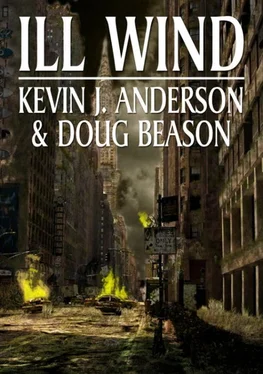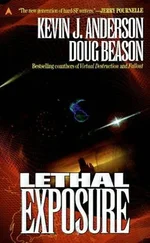“That’s a problem, sir.” She shuffled through her papers again, but he could tell she was just avoiding his gaze. “We think perhaps another organization should handle this—”
“I’m sick of doubletalk,” Mayeaux growled, flicking his glance to skewer every person in the room. “I asked a question—give me the fucking answer!”
The NSA team chief continued. “Los Angeles refused to establish martial law, sir. We have word from the city’s mayor that they are considering seceding from the nation. They do not want to participate in conscription activities or food taxation. The mayor has ordered breaking open all military stockpiles of food to the populace at large. From what we can tell, the military in the Los Angeles area is cooperating with this action, directly countermanding your orders.”
She stacked her papers neatly. “The last we heard was a call for action to help some sort of expedition going to New Mexico from the Jet Propulsion Laboratory. It wasn’t clear what was going on, but the New Mexico connection may be a symptom of breakdown in martial law across the country. JPL has commandeered Caltech’s Emergency Network Radio node and they also refuse to cooperate with FEMA or any other emergency agencies. They are apparently behind this expedition.”
Deep resentment ran through Mayeaux. He had to push with a crowbar to get anyone to tell him bad news. Did they really fear him that much, or were they crawfishin’ around the issue?
“ Mais , let me tell you something. This crap has gone too far. It’s going to stop, right now. I didn’t ask for this damned responsibility, but I will not be remembered as the man who allowed the United States to fall apart.” He turned to Frank Weathersee. “Pull the Joint Chiefs in here, right now. I want more information, and if they give you any grief in return, throw their asses out. Period.”
Weathersee stiffened. “Very well, Mr. President.”
Mayeaux was on a roll now. Sometimes it felt damned good to kick some butt. He hunched over the table, talking rapidly. On reflection, he thought he sounded very presidential. “That expedition to New Mexico. Are they spreading this call for secession? Did they instigate this damned mess in LA? Who was that general I met at Kirtland a few months ago, on my way to Acapulco—” He snapped his fingers, trying to remember.
“Bayclock, sir.”
“That’s right. Have the Chiefs warn General Bayclock there’s some sort of traitor movement heading his way. He seemed like a down-to-earth man. Make sure the general understands that everyone must support him, nip this thing in the bud, all that rah rah stuff. This might be the test for keeping anarchy in check.”
Weathersee looked unconvinced. “Yes, sir, traitor movement. Any other items the Joint Chiefs should work on?”
“So far we’re nothing but a voice over a radio to these people. We don’t have any way to back up our threats.” He set his mouth. “Make sure the Vice President has this information at the Naval Observatory. And have the Chiefs draw up a plan to make an example of… something—if LA is going to try to secede, maybe they need a knock on the head to set them right.”
He steepled his fingers. “Take a lesson from history. Abraham Lincoln took that step. He threw most of the Baltimore businessmen and newspaper editors in jail when they wouldn’t support him. Sure taught them a lesson!”
“What do you propose, Mr. President?” Weathersee said.
He glared at his Chief of Staff. “Hell, I don’t know. Maybe take out Catalina Island with a nuke. We’re in touch with the subs again, after all.”
Weathersee stood tall, his arms at his sides, as he looked at Mayeaux. “If you’re going to take a lesson from history, sir, perhaps you should remember what happened to President Lincoln. I just thought I should remind you of that.”
“Hey, Lieutenant,” Spencer asked, “what do you know about military intelligence?”
“Military intelligence? That’s how I remember the definition of the word ‘oxymoron.’” Bobby Carron looked up from untying the tentlike sun-screen at the blockhouse corner. The sun had set over the Organ Mountains, and already the high desert air took on a chill. “Me, I just flew fighters—you know, grapefruit and peas.”
“Grapefruit and peas?” Spencer made a disgusted grimace. “Is that what they feed you guys?”
Bobby laughed. “No, sir. It’s just what they say about us fighter pilots. Balls the size of grapefruits, brains the size of peas.”
“I see.” Spencer chuckled. “Come on inside the trailer. You’re the only military type around here. You might be able to figure this out.”
“Right.” Bobby left the cords dangle from the sprawling sun-screen tent made of parachute silk. To keep the bunkers cooler during the hottest part of the day, Spencer’s group had obtained some surplus fabric in Alamogordo. Stenciled on the parachutes were the words HOLLOMAN AIR FORCE BASE, taken from the closing of the base a few years earlier. After high evening winds had torn away the last sun-screen, taking down the parachute had become Bobby’s nightly ritual.
Bobby followed Spencer inside the trailer, where Juan Romero listened to the voices coming over the static-filled speaker, pursing his lips in a confused frown that made his black moustache stick out at the sides. Electronic equipment lay on the tabletops, cannibalized for parts used in the makeshift radio. Romero rolled his eyes at the signal. “Everything’s encrypted.”
“…Niner niner rog. Turtle mound advised of bandit watch.” Other nonsensical phrases jabbered over the channel.
Spencer watched Bobby Carron as the Navy pilot digested the cryptic information. “Any idea what they’re saying, Lieutenant?”
“I recognize some code words,” Bobby said, frowning as he concentrated. “Maybe they can’t get their regular encryption gear working.” He stared at the makeshift equipment as if in a trance. Spencer said nothing.
Three electric lanterns lit the control room against the darkness outside; they used solar power stored in batteries during the day’s transit of the smallsat cluster. A cool breeze swept through the door, bringing a sweet hint of yucca.
Romero glanced at Bobby. “How can he understand what they’re saying when the static is this bad? Must be sunspots.”
“Ever heard a pilot talk on the radio?” Spencer said. “You can’t understand a thing they’re saying until you do it yourself.”
Bobby held up a hand. He spoke as if he were reciting a passage: “They’re saying something like: events have gotten out of hand. Take all actions necessary to ensure the continuity of—” He hesitated, then shook his head. “Damn,” he muttered, “Some of the stuff just doesn’t make any sense.”
“Go on,” said Spencer. He motioned for Romero to sit back down. Rita Fellenstein joined them from the back room. She had been making eyes at Bobby ever since he had arrived, much to the dismay of the other ranch hands.
Three minutes passed before the mixed-up transmission stopped. Bobby scribbled in pencil on a small notepad. His forehead held a sheen of sweat.
“As far as I can tell, General Bayclock has been ordered to occupy your installation at White Sands. He’s to show an iron hand. All assets of something—the California expedition?—are to be confiscated and turned over to the United States.”
Spencer exchanged glances with Rita. “I hope that doesn’t mean the mission from JPL.”
Bobby continued, “The general is authorized to use whatever force necessary to preserve the integrity of the United States.”
“What the hell does that mean?” muttered Rita.
“It means we’ve been declared open game, and this Bayclock clown can come and blow us away, man!” Romero stood up, knocking back his chair and flinging his long black hair out of his eyes like a dangerous bandit.
Читать дальше












